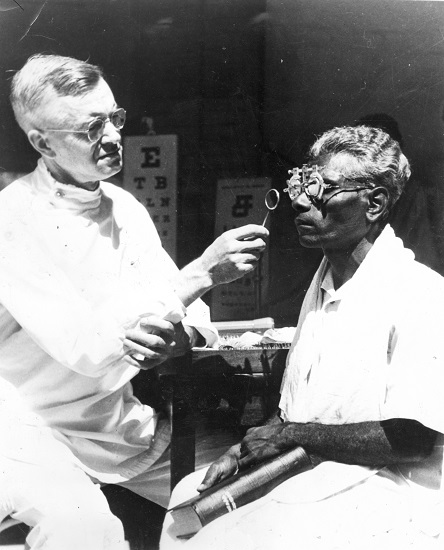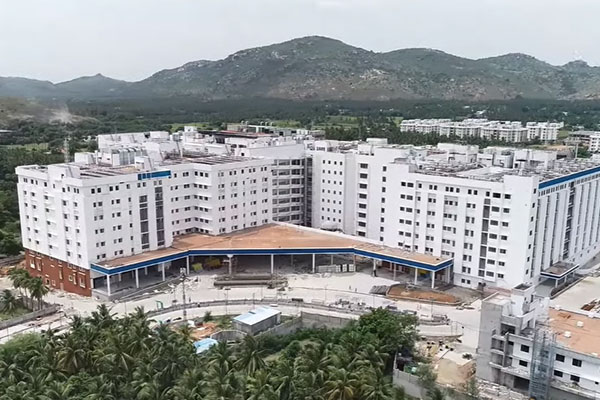There are 2.2 billion people in the world who have a vision impairment or blindness. Around 1 billion need glasses and do not have them. India has 20% of the world’s severely visually challenged people. Using 2010 data, that means about
56 million people in India are blind or have low vision
Many of those people have a visual impairment that can be easily fixed: they need glasses or cataract surgery. Yet, they remain untreated.
Ida Scudder started her roadside clinics back in 1906. But it was Dr. Victor Rambo who held the world’s first Eye Camp. He had a heart for the thousands of people who were needlessly losing their eyesight.
CMC’s Ophthalmology (Eye) Department continues to care for people in the rural areas of Vellore. Read how Mala was blind, but can now see. And learn more about our Eye Department below.
Was blind, but now I see!
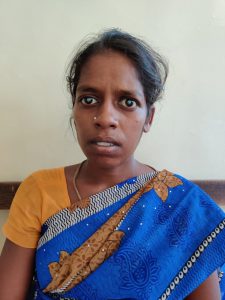
26-year old Mala* is a manual labourer from the isolated Jawadhi Hills (a few hours from Vellore). She lives with her seven-year-old daughter and her husband who works in a tile manufacturing company in Coimbatore.
Over the last year, Mala knew she was gradually losing her eyesight. However, she was juggling work, looking after her daughter and household chores. Another baby was on the way. So, going for an eye checkup was the last thing on her mind.
Towards the end of her pregnancy, Mala’s vision became so bad that she needed support even for her daily activities like washing and cooking. Her husband was away working in Coimbatore. She depended on her sister and mother who live nearby.
CMC outreach Clinic in the Jawadhi hills
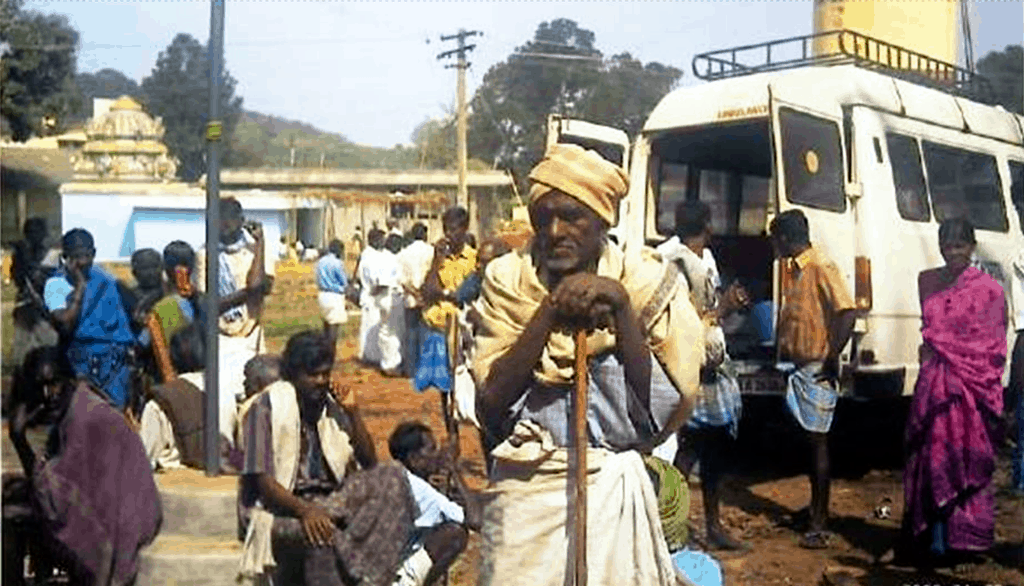
Teams from CMC’s Community Health Department (CHAD) show their dedication and go the extra mile. In fact, they go many miles, up to the Jawadhi Hills on a regular basis. They use the mobile clinic van to make the 2+ hour journey (each way).
The tribal people from the hills do not want to come to Vellore for any health-related issues. So, the mobile clinic is the best way to bring healthcare to the community. Anybody who is very sick, or needs an operation, has to come down to CHAD hospital.
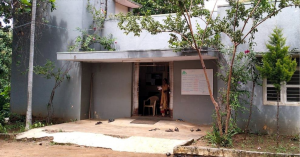
At one of the mobile clinic’s regular trips, a CHAD doctor met Mala. She was now almost blind and had to be led by the hand. He was worried that she could fall down on the uneven terrain in the Jawadhi hills. She needed cataract surgery, in both eyes, right away. But first, they had to convince her mother to let her go to the hospital on the plains. After much persuasion, she agreed and Mala went to the Schell Eye Hospital.
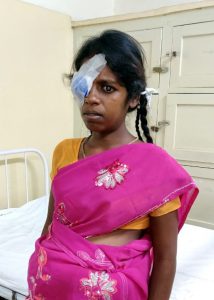
Cataract surgery and more…
At the Eye Hospital, Mala’s doctors prepared for her surgery. There was no time to waste since she was heavily pregnant, and could go into labour at any time. They completed the surgery for her right eye in February, 2020.
While she was recovering, she went into labour. She was rushed to the CHAD hospital and delivered a beautiful baby. There are no delivery services up in the hills, so this was good timing!
“We covered the cost of her treatment through grants and donations from faithful supporters.“
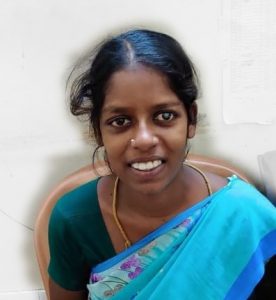
However, before they could operate on her left eye, she went home to Jawadhi, with her new baby but only one working eye. She did not want to come back. The CMC team found her and had to convince her all over again to come for the second surgery. But then, she got a fever. Fortunately, she tested negative for COVID-19 and the fever settled in a couple of days. Finally, in May, they operated on her left eye.
Imagine her delight: she could see clearly again after such a long time! She could enjoy her children’s smiles! She returned to the hills longing to see her husband’s face.
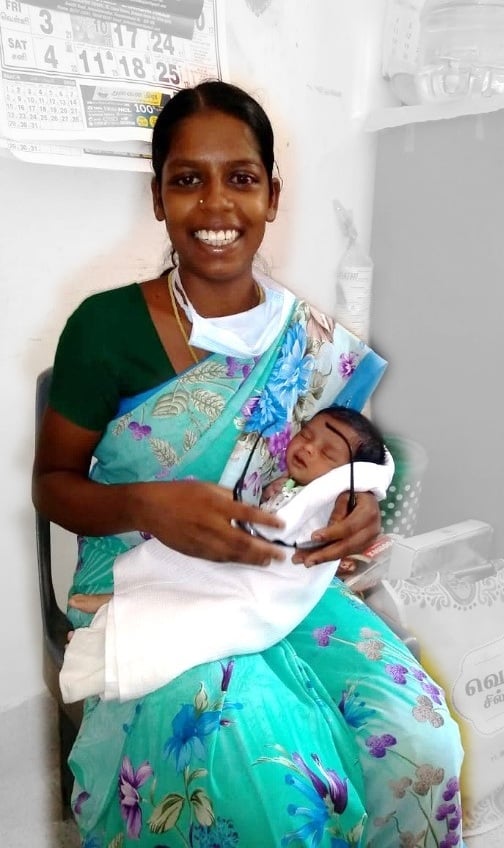
What a privilege to help transform Mala’s life!
Give The Gift of Sight
Through your help, many others can have similar treatment.
Please support
CMC’s Eye Camps and Cataract Surgeries.
Click here to Donate
Thank you
*name changed
Dr. Victor Rambo
Born in Landour to missionary parents, Dr. Victor Rambo grew up watching his parents serving people in India. He studied medicine and graduated from the University of Pennsylvania in Philadelphia, USA. From a young age, he was determined to become a missionary doctor and this passion caused him to turn down a prestigious job offer from his alma matter, Pennsylvania Hospital. In 1924, Dr. Victor, and his wife Louise, came to India. After language training they were sent to Christian Hospital Mungeli, in Central India. He had a heart for the thousands of people who were needlessly losing their eyesight. Dr. Victor developed techniques and skills in cataract surgery and people flocked to be treated. However, he realised that most blind people in remote villages would never be able to come to the hospital. He longed to take the care they needed to them.
The first Eye Mobile Clinic
In March 1943, he and his team planned the first mobile eye clinic in Kawardha, 50 kms away from Mungeli in Chattisgarh. With the first camp a success, many more were organised. A ‘bearer of the news’ would go a week ahead to announce the eye camp. The team visited the village and conducted the eye checks and surgeries. Dr. Victor pioneered faster operations, to help as many as possible. They were cared for until the stitches were removed. New glasses were given out as they joyfully exclaimed “I can see!”
Teaching was another passion, and in 1947 he joined Christian Medical College Vellore, to lead the Ophthalmology Department. He enjoyed the opportunity to train both medical and nursing students, but nothing could keep him from starting eye camps at CMC as well.
Famous for his humour, he would dance a ‘jig’ on a table to make his patients laugh and relax them before their cataract surgery.
Today, CMC’s Ophthalmology Department continues to look outward and beyond hospital services. They follow Victor Rambo’s example of dedicated service. Eye Camp teams still go out to the villages three times a week. However, they no longer a need to operate in a tent. The patients come to the Eye hospital for their surgery and can usually return home, clear sighted, within 24 hours.
Donate today and give the gift of sight! A typical cataract operation costs around Rs. 16,000
Please support
CMC’s Eye Camps and Cataract Surgeries.
Click here to Donate
Read Dorothy Clark’s story of Dr. Victor Rambo life – The Apostle of Sight
The Ophthalmology Dept
The Ophthalmology Department treats all kinds of eye problems. They use medicines, eye glasses, contact lenses and operations. The Outreach Unit is committed to making it as easy as possible for patients to get treatment. They have many community based clinics – held close to where people live – as well as at the main Schell Eye Hospital.
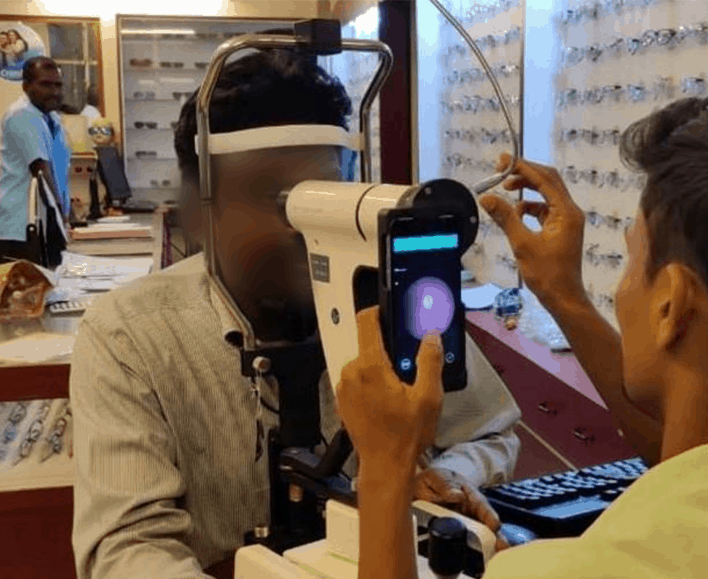
in 1948, in Gudiyattam near Vellore. Dr. Victor and his team did 69 cataract surgeries in the field that day! The eye camp model was then adopted by many other hospitals around India and is still used today. CMC still organises several eye camps each week, but we no longer operate in the field. Those needing surgery are helped to come to hospital for a free operation.
What the Eye Team do
The Ophthalmology Department’s vision is:
To provide accessible, affordable and acceptable eye care services to all persons needing eye related care in our service areas …….
One way they do this is through their outreach clinics.
Ophthalmology Team Go the Extra Mile.
They now hold regular clinics in 5 different peripheral sites. This means a lot of travelling, sometimes on rough roads! Below is a diagram showing where these regular clinics are held.
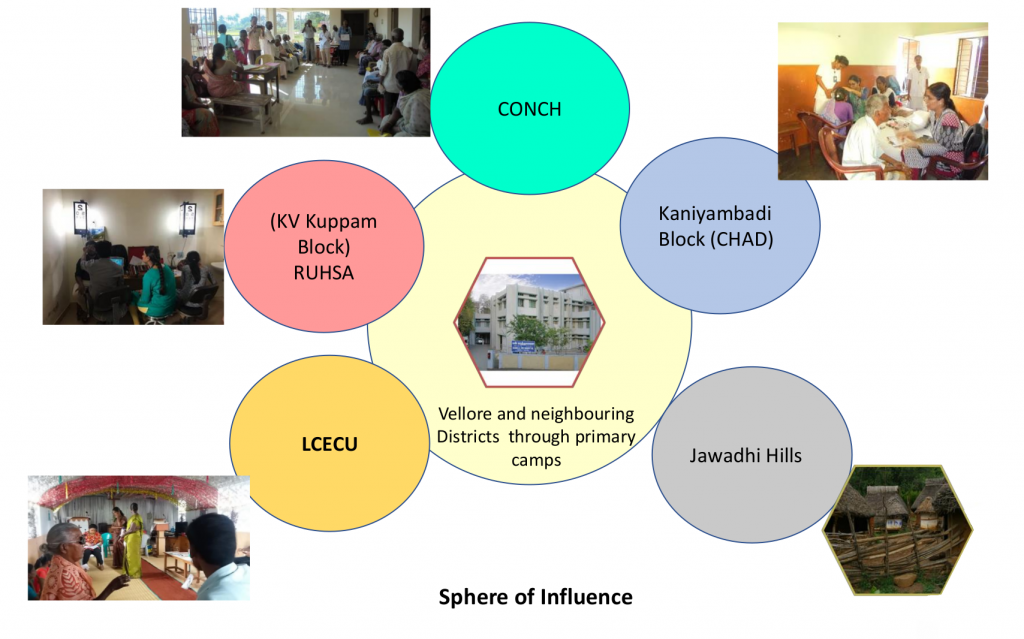
Community eye clinics are held in
- Urban areas in Vellore City and rural areas to the east through CONCH, the College of Nursing Community Health Department;
- CHAD hospital in Bagayam and Kaniyambadi Block to the south;
- LCECU, covering Vellore urban slums;
- The Jawadhi hills where CHAD has a clinic and the
- At RUHSA in KV Kuppam Block to the West of Vellore
- Chittoor Hospital, to the north in Andhra Pradesh. This now has its own Eye Department.
The journey is not always that easy!
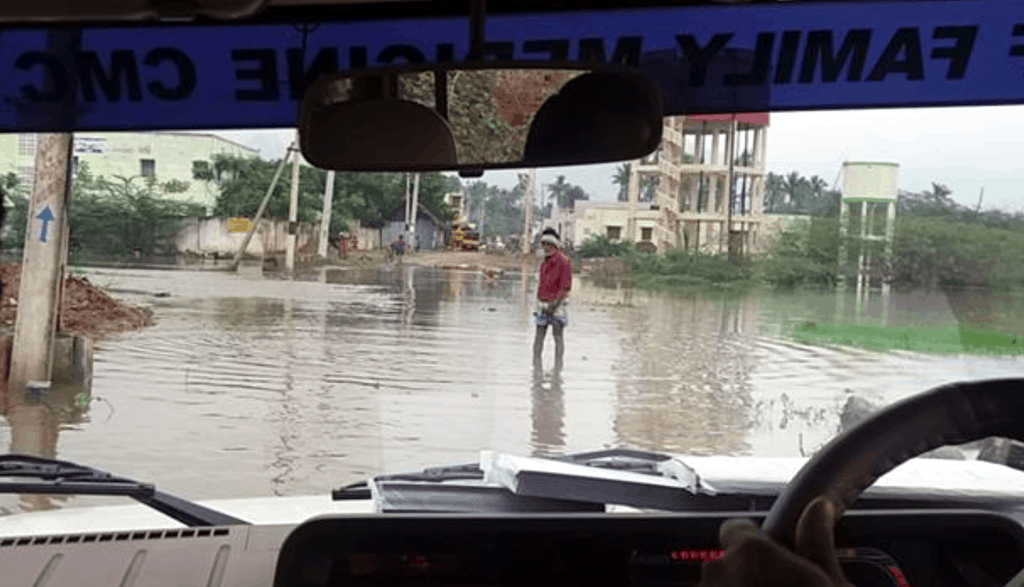
CMC staff go to clinics through rain and high water for their patients! 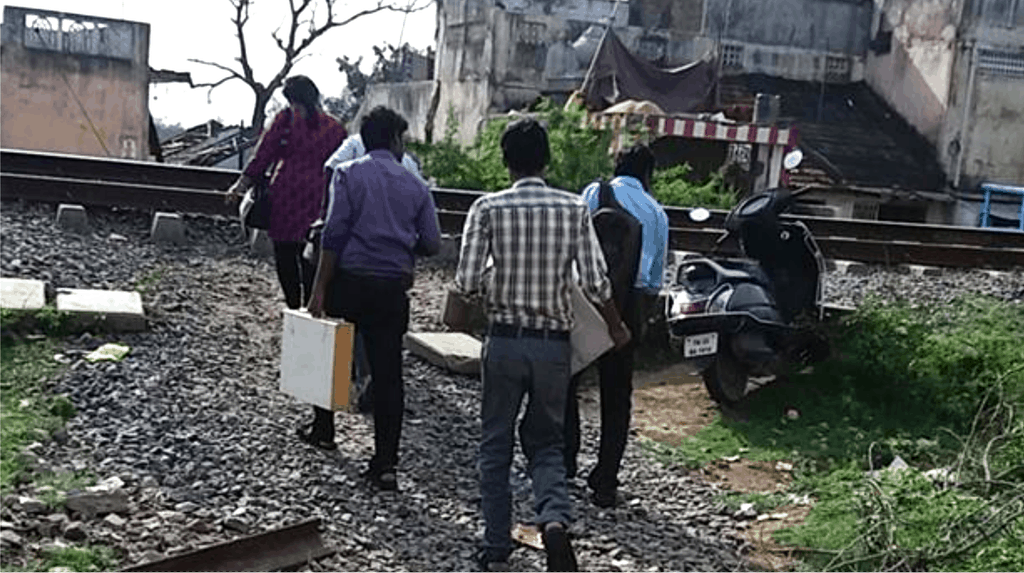
The ophthalmology team carries what they need to the LCECU clinic in Vellore
Screening for Diabetic Retinopathy
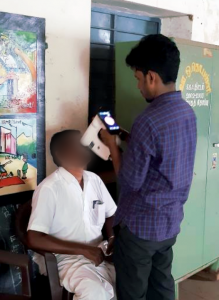
Sadly, diabetes is very common in India and often affects younger people than in western countries. Diabetes can cause serious eye complications, which can lead to blindness. A common complication is Diabetic Retinopathy (DR), which is a treatable condition. The Eye Department now screens people with diabetes for DR.
To detect DR you need to look at the back of the eye, the retina. A doctor can find the signs using an ophthalmoscope.
However, now we can use a Fundus Camera to take a digital picture of the retina. A technician can take the photo in the field, and the doctor will look at it later. This makes screening easier and quicker. The pictures can even be sent through the internet to the doctor (teleconsultation). Some cameras are large and difficult to transport. But there are now small hand held devices that can go to the outreach clinics and camps (see photos).
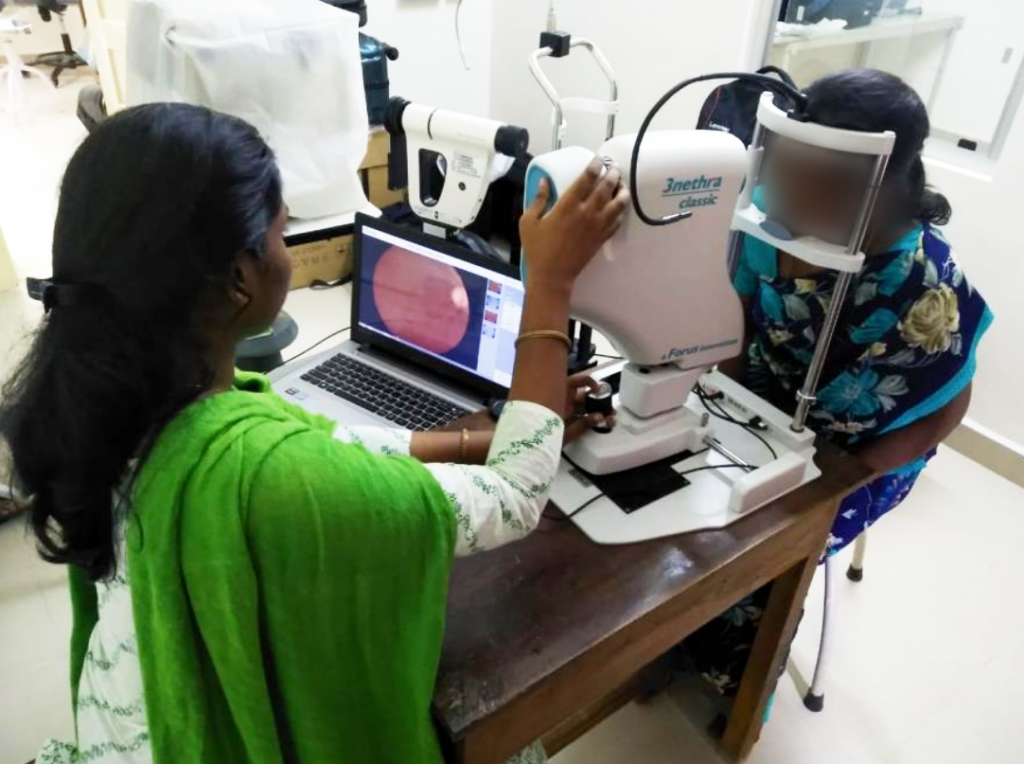
Mobile Clinic to Screen for and Treat Diabetic Retinopathy
Diabetic retinopathy can be treated using a laser to fix the damaged areas at the back of the eye. This can be done in an outpatient clinic. But many people advised to come for treatment, never come to the Eye Hospital. They may be frightened of hospital, short of money for the travel, or unable to leave home, even for a day. We are buying a mobile clinic van equipped with a laser machine. This will allow us to both screen and treat for DR in the field.
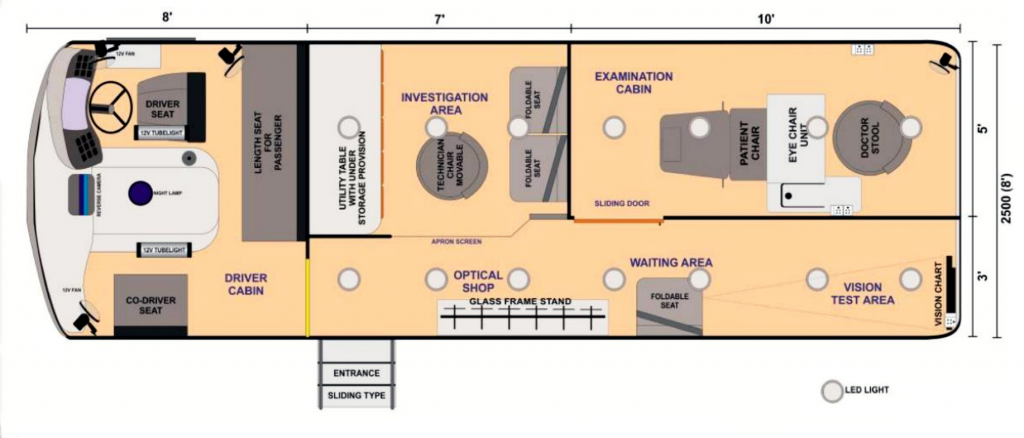
Most of the money needed for this has been given by Friends of Vellore groups around the world. Unfortunately, the COVID-19 pandemic has put the purchase of the van on hold. We need more funds to help with the purchase and running costs of the “Mobile Screen and Treat Diabetic Retinopathy Programme”.
You can read more about the Ophthalmology Department here.
Ophthalmology at Chittoor hospital
The Chittoor Hospital in Andra Pradesh now has its own Ophthalmology Department, but they work closely with the team at the Schell Hospital. They need funds to build a dedicated eye operation theatre there.
Thanks to Dr. Padma Paul and her team for all the fantastic photographs we have used here.
First Posted August 21st 2020. Last Updated October 2020


